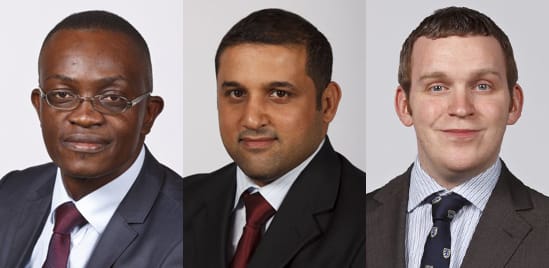With 100 times the strength of steel, the thermal properties of diamond and better electrical conductivity than copper, carbon nanomaterials have immense promise in a range of applications. Thanks to a group of alumni from the Cambridge Executive MBA, their commercial potential may very soon be opened up.
A team consulting project
For their Team Consulting Project on the Executive MBA, Benoit Gauthier and a group of fellow participants co-founded the Cambridge Nanotechnology Alliance to promote partnership between academia and industry.
Its goal is to lower the adoption barrier for nanomaterials across key sectors, bringing them to a sustainable level of mass production and finding ways to commercialise them safely in real-world applications.
The Alliance is based on collaboration between industry, research, investors, entrepreneurs and regulators.
Business success
Benoit first appreciated the potential of nanotechnology when he met Dr Krzysztof Koziol, Head of the Electric Carbon Nanomaterials Group at the University’s Department of Materials Science.
The Team Consulting Project – a compulsory part of the programme – is a practical exercise that often has a direct and immediate impact on participants’ working lives. Benoit, who is Head of Finance and Administration at Airbus Helicopters in Chile, has been able to involve his own company from the beginning.
The Cambridge technology cluster
Benoit Gauthier: I took my Executive MBA in 2011 through 2013. I chose to do my EMBA at Cambridge University, because I’ve always been interested in entrepreneurship, but never been able to test it throughout my career. Cambridge is one of the biggest technology clusters in the world. And how you could resist to come to Cambridge and have access to this open innovation platform that is almost 800 years old?
Dr Krzysztof Koziol: I met Benoit in 2012. He approached me because there was the team consulting project that he had to do as part of his Executive MBA course. And he thought that there may be some interesting projects to actually work with me here. And explore some of these ideas that we have been working on for a few years now.
Carbon nanofibers, a hundred times stronger than steel
Benoit Gauthier: We went to an event about nanotechnology that was held in Cambridge. We got acquainted with Dr Koziol who put in our hands a basic network cable that was made of carbon nanofibers. And touching this technology with our hands was a revelation.
Dr Krzysztof Koziol: These are very small materials. They are 100 times stronger than steel. Higher in thermal properties than diamonds. More conductive than copper. And what we are trying to do here is we are trying to explore, how do you take these exciting, high performance materials and really bring them to the actual everyday use?
Collaborating on putting technology and research into practice
Benoit Gauthier: Within the Team Consulting Project and the Individual Project, we have decided to create this Nano-Manufacturing Alliance. The idea is to have non-competing companies, within the alliance, in order to create a collaborative approach and open innovation. Basically, the Nano-Manufacturing Alliance is based on a collaboration between industry, research, investors, entrepreneurs and regulators. And the involvement of Airbus Group, within this alliance, is to be what we call a demand driver. Which will be in fact, putting the technology and putting the research towards application that they already have. For example, embedding nanocarbon into the composite bodies of the aircraft or even satellites.
Dr Krzysztof Koziol: The Nanotechnology Alliance, as a platform, will enable the transfer of the ideas and technologies that we create, which we generate in this department, into the outside world. Which otherwise might be actually very difficult. And often we see that various ideas are killed, because really it’s difficult to bring it to the commercial sort of stage.
Bringing together a team from across the University of Cambridge
Benoit Gauthier: We tried to call on board all the members of a multifunctional team as we are taught to do in the EMBA. Trying to have the richest team on board to have different perspectives in order to solve this complex issue.
Dr Krzysztof Koziol: We are talking to our colleagues from Department of Engineering. From Physics. And trying to come together and work together in a team here at the University. And think of the exciting projects, which we are obviously creating and that we will be able to bring to the Nanotechnology Alliance platform for further exploration.
Benoit Gauthier: Today, I’m still working with a team of former students in the same EMBA class that I was. Eddie Elcomb, Chris Weeks, Mohamed Lamin are still colleagues. And we still connect with Skype meetings and Google Hangouts as we used to be doing during the EMBA.
What we’re trying to do is explore how we can take these exciting, high-performance materials and bring them to everyday use. The Nanotechnology Alliance will enable the transfer of the ideas and technology that we generate in this department into the outside world, which otherwise might be very difficult. Often we find those ideas are killed because it’s difficult to bring them to the commercial stage. The idea is to have non-competing companies within the Alliance, in order to create a collaborative approach and open innovation. The involvement of Airbus Group within the Alliance is to be a demand driver – pulling the technology and research towards applications that they already have. For example, embedding nanocarbon in the composite bodies of cars, aircraft or even satellites.
Entrepreneurial skills to the test
Benoit chose to take his EMBA at the University of Cambridge for its entrepreneurial ethos, and because it granted access to an unrivalled wealth of knowledge and ideas across many different fields.
I’ve always been interested in entrepreneurship but never been able to test it throughout my career. Cambridge is one of the biggest technological clusters in the world. How could I resist coming to Cambridge and having access to this open innovation platform that is almost 800 years old?
Accordingly, the Alliance is fostering cross-disciplinary research at the University.
We are talking to our colleagues from the Department of Engineering and from Physics – trying to work together as a team, and to think of the exciting projects we will be able to bring to the Alliance for further exploration
Working remotely with team members

What’s more, Benoit’s fellow members of the Team Consulting Project – Eddie Elcomb, Mohamed Lamin and Chris Weeks – are still very much involved.
We keep in touch on Skype and Google Hangouts, and every time we’ve all been in Europe or the UK we’ve met. We were in Cambridge recently to discuss the Alliance with Krzysztof. We’ve found someone who is keen to take on the role of principal to pull things together and manage it on a day-to-day basis. Our role is more ambassadorial – going out there, speaking to people and drumming up commitment. We’re very keen to have a formal launch this year, and have been working really hard towards it.


